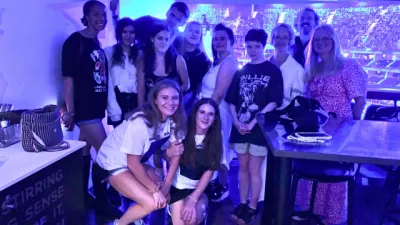There’s nothing quite like the buzz of live music. The lights, the crowd, the energy—it’s electric. But if you live with epilepsy, you might wonder whether concerts are safe or even possible. The answer from the Youth Voice Network? Absolutely yes.
At Young Epilepsy, we believe that epilepsy should never be a barrier to doing what you love. That’s why we’ve teamed up with members of our Youth Voice Network to share their real-life tips for attending concerts with confidence, safety, and joy.
You’re Part of a Community

There is absolutely no danger in going to a concert with epilepsy! When you go to a concert, you’re part of a community supporting the same act, and if anything happens to you, those people will always be there to help!One Youth Voice Network member put it perfectly
That sense of belonging is powerful. Whether you’re dancing in the front row or soaking it all in from the back, you’re surrounded by people who share your passion. And with a little planning, you can make the experience both safe and unforgettable.
Your Concert Game Plan
Here are the top tips from our Youth Voice Network to help you prepare:
1. Bring a Buddy
Always go with someone you trust. Having a friend or family member with you means there’s someone who understands your needs and can support you if anything happens.
2. Have a Game Plan
Know the venue layout, arrival time, and best exit routes. Planning ahead reduces stress and helps you feel more in control. As one young person shared,
“Knowing what time to get there and the best routes to leave just helps eliminate any stress.”
3. Check for Flashing Lights
Some concerts use strobe or flashing lights, which can be a trigger for photosensitive epilepsy. Check the event details or contact the venue in advance to find out what to expect.
4. Charge Your Devices
If you use an electronic seizure alert device, make sure it’s fully charged before you leave. It’s a small step that can make a big difference.
5. Pack Your Medication
Bring your medication with you, or make sure you take it as soon as you get home. Keeping your routine steady helps reduce the risk of seizures.
6. Plan for the Day After
Concerts can be late and tiring. Give yourself time to rest the next day. A low-key recovery day can help your body and brain recharge.
7. Have a Seizure Plan
Talk to your concert buddy about what to do if you have a seizure. Whether it’s helping you to a quiet space or calling for medical help, having a plan in place gives everyone peace of mind.
You Belong in the Crowd
Living with epilepsy doesn’t mean missing out. With the right preparation, you can enjoy the music, the atmosphere, and the memories—just like anyone else.
So go ahead—book the ticket, wear your favourite band tee, and sing your heart out. You’ve got this.
Want to connect with others who get it?
Join the Youth Voice Network and be part of a community that empowers, supports, and celebrates young people with epilepsy.






